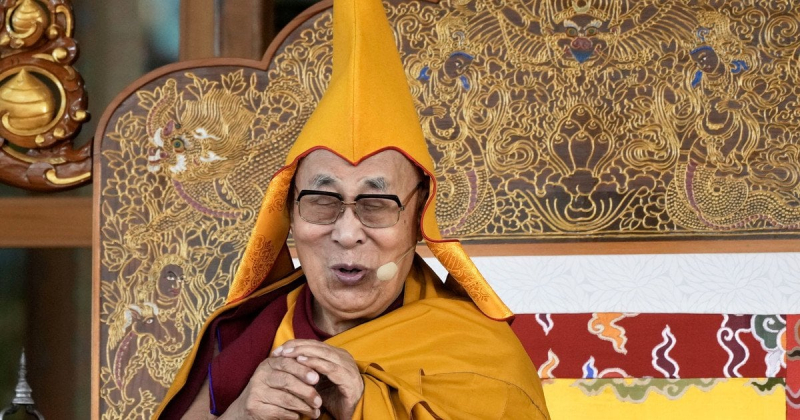At 90, the Dalai Lama has put to rest long-running speculation about his successor with a major announcement. He confirmed that reincarnation will take place and detailed the process, which directly challenges China's position.

The Dalai Lama assured followers on Wednesday, July 2, that after his death he will be reincarnated as the next spiritual leader of Tibetan Buddhism. The long-awaited announcement, made days before his 90th birthday, ended speculation that the Dalai Lama himself had started when he previously said he could be Tibet's last spiritual leader.
Reuters reports this.
Who could succeed the Dalai Lama?
Speaking during week-long celebrations of his birthday in the northern Indian hill town of Dharamsala, the Dalai Lama said the non-profit trust he founded would have sole authority over his reincarnation, pushing back against China's insistence that Beijing choose his successor.
“I affirm that the institution of the Dalai Lama will continue to exist,” the Dalai Lama said in a video message.
He added that the Gaden Phodrang Trust, a non-profit organization he created to support the tradition and institution of the Dalai Lama, has the exclusive right to recognize his reincarnation in consultation with the heads of Tibetan Buddhist traditions.
“They must carry out the search and recognition procedures in accordance with past traditions… no one else has any authority to interfere in this matter,” he stressed.
A senior official at the Gaden Phodrang Trust, Samdhong Rinpoche, said the Dalai Lama was in good health and had not yet given any written instructions on succession.
He also told reporters that the successor could be of either gender and his citizenship would not be limited to Tibet.
Tibetan tradition holds that the soul of a Buddhist spiritual leader is reincarnated into the body of a child after his death. The current Dalai Lama was born Lham Thondup to a family of farmers in what is now Qinghai Province. At the age of two, a search party of monks identified him as the reincarnation of the Dalai Lama's soul.
Confrontation with Beijing
Beijing said again the same day that it must approve the reincarnation, and that it must be done in China because of the centuries-old ritual. China views the Dalai Lama, who fled to India from Tibet in 1959 after a failed uprising against Chinese authorities, as a separatist. The Dalai Lama has continued to say that his successor will be born outside China and has called on his followers to reject any successor chosen by Beijing.
A US State Department spokesman said they would continue to urge China to stop interfering in the succession process and respect religious freedom.
“We will also continue to call on China to stop interfering with the legacy of the Dalai Lama and other Tibetan Buddhist lamas and to respect the freedom of religion or belief of persons of all faiths,” the speaker added.
Penpa Tsering, the leader of the Central Tibetan Administration (the Tibetan government in exile in India), said the Dalai Lama was open to visiting Tibet if his health permitted and there were no restrictions from China. However, he noted Beijing's condition that he must reside permanently.
“His Holiness’s answer is, ‘If I go to Tibet and China, I will not live there because there is no freedom.’ This also has to do with reincarnation, where His Holiness says, ‘I must be born in a free world,’” Tsering said.
Chinese Foreign Ministry spokeswoman Mao Ning said Beijing has the right to approve the Dalai Lama's successor, citing the country's imperial legacy and its policy of religious freedom. The selection ritual, in which the names of potential reincarnations are drawn from a golden urn, dates back to 1793.
“The reincarnation of a child of a major Living Buddha, such as the Dalai Lama and Panchen Lama, must be identified by drawing lots from a golden urn and approved by the central government,” Mao Ning said.
The Dalai Lama and the Panchen Lama: Key Roles in Buddhism
In the Tibetan Buddhist system, the Dalai Lama and the Panchen Lama are the two most important spiritual leaders. They are each other's reincarnations, which is fundamental to maintaining the lineage.
However, this tradition has faced a major controversy. In 1995, the 14th Dalai Lama recognized 6-year-old Gedhun Choekyi Nyima as the 11th Panchen Lama. However, the child was soon kidnapped by Chinese authorities, and his fate is still unknown. Beijing chose and appointed its own Panchen Lama, Hyalkayin Norbu, who is under the control of the Chinese government. Thus, there are two Panchen Lamas in the world, one recognized by most Tibetans and the global Buddhist community, and the other only by China.
This situation is a clear example of China's interference in Tibetan spiritual affairs. By controlling the selection process of the Panchen Lama, Beijing seeks to lay the groundwork for its control over the next reincarnation of the Dalai Lama. determined independently of Beijing's interference, is of such great importance.
Let us recall that China is modernizing its army for a lightning attack on Taiwan. Beijing has significantly increased its combat capability, which causes serious concern for Taipei and the United States.

